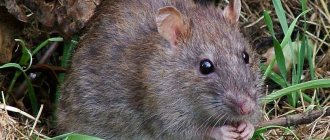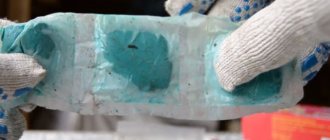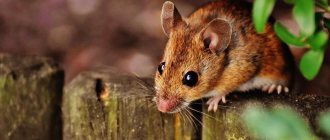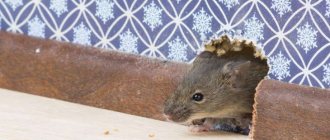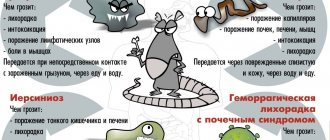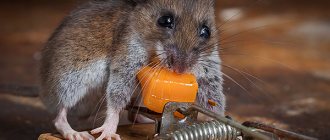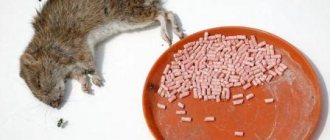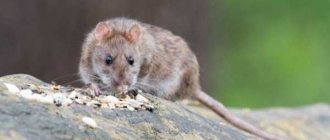Mice are unpleasant guests in the house, which is worth the damage to the house - they gnaw through walls, spoil furniture, food, and supplies. And this is only a small part of what can come from the life of rodents.
The fight against them is difficult, because gray creatures are endowed with excellent intelligence and intelligence; they can quickly remember places where there are traps or poisonous substances. But there are still some means to eliminate these creatures.
It is worth considering that mice are afraid of light, strong smells of plants, sounds and other available means.
For this reason, it is worth carefully considering folk options that will help overcome gray rodents.
How to get rid of Mice?
Why “aromatherapy”?
Because it is a cheap, accessible, humane and safe way to get rid of rodents. Whichever other method you choose, you will have to face certain difficulties.
For example, the use of chemicals, despite their high efficiency, is not always possible. If there are children, allergy sufferers or pets in the apartment, the use of poisons can result in tragedy. In addition, this method, like the use of mousetraps, forces one to deal with the need to dispose of corpses, which is extremely unpleasant. Add to this the deadly smell if the rodent that has eaten the chemicals manages to hide securely before dying.
As for the ultrasonic device, it is not affordable for everyone. In addition, it works over a certain area, so on a large scale it requires knowledge of approximate mouse routes.
Against this background, phytoprotection recipes are an excellent alternative to getting rid of uninvited guests. Aromas that mice do not like cause the latter to hastily leave the premises and prevent them from repopulating.
The effectiveness of the repellent method
Opinions about the effectiveness of the method differ. Some believe that rats are smart creatures that are not afraid of repellents and quickly get used to them. Others, on the contrary, believe that rodents can be driven away from the territory with simple grass. The main thing is to know which one and how to use it correctly. There are also skeptics regarding ultrasonic repellers. They are sure that the devices are not effective and are a waste of money.
Every opinion has a right to exist. Since there are many ways to scare away rats, their effectiveness can only be verified experimentally. This is what people have been doing for many years. During this time, it was possible to identify truly effective methods and study industrial products.
Using the scents of natural enemies
It's no secret that rodents are afraid of cats, which are considered their main “thunderstorm.” However, this trend is more true for village cats than for pets living in comfortable apartments.
But should you be upset if your purr runs away in fear from one type of mouse, and you can’t rely on his hunting instincts? No, because you can drive out uninvited gray guests using the smell of a cat, or rather its urine. To do this, you can place used cat litter near the holes or soak rags with urine. Inhalation of ammonia vapor leads to a sharp decrease in the number of mouse offspring, causing the population to die out faster.
However, even more than cats, small rodents are afraid of snakes and rats. For the former, they act as natural food, while the latter fight with them for the same food sources and destroy their burrows. Therefore, mice can smell the excrement of their enemies a mile away and avoid them. You can easily become the owner of this “wealth” in any pet store.
Using these methods in an apartment is not very pleasant, but they are quite suitable for dachas, vegetable gardens and non-residential premises.
Chemicals
Chemicals used to control mice in the home guarantee 100% rodent mortality. The range of products is varied and is divided into several groups:
- Preparations of herbal and synthetic origin with maximum effectiveness of the latter.
- Release form: granular, powdered tablets, liquid, gel, cream. A separate category are aerosol-type substances intended for surface treatment. In this case, the rodent comes into contact with the resulting coating, particles of poison fall on the fur, from where it gets inside the animal (after licking, which we call washing).
- Method of exposure, divided into drugs with immediate and chronic action. In the first, the substance poisons the mouse immediately after entering the body, in the second, it kills within 2-3 days. The point of prolonged exposure is to ensure that animal corpses do not accumulate near the feeder with poisoned bait. In this case, others will avoid her.
- According to penetrating abilities. Here drugs are classified into 3 groups. Fumigants are substances that enter the body through the lungs, intestinal substances are those that must be eaten, and contact substances are those that act through the skin.
Poison packaged in bags Source stopklopu.com
Domestic rat poison Source severdv.ru
Gel remedy against mice and rats Source vrediteli24.ru
Important! Poisoning mice with chemicals is an effective remedy, but it has one significant drawback: after the rodent has eaten the poison, it crawls away and dies there, in its burrow, under the baseboard, inside the gypsum board partition. In general, where it is quite problematic to get it from.
The magical power of nature
There are a huge number of plants that effectively fight against mice. What aroma do they not tolerate?
- Blackroot is a poisonous perennial that not only repels mice, but also kills them. In its thickets, the pest quickly dies, for which it does not even need to taste the grass. Thanks to the large amount of poisonous alkaloids, the rodent simply goes crazy. It is not surprising that mice sense a threat and avoid the blackroot.
- Elderberry root, which produces poisonous hydrocyanic acid.
- Swamp wild rosemary, the smell of which rodents cannot stand.
Remember that these three plants are poisonous, so they are not recommended for use in a home where there are small children, cats and dogs. There is a chance that they will not resist the temptation to try interesting twigs for their teeth. Don’t forget about personal safety measures and use gloves.
In residential areas, it is better to use herbs that will definitely not cause problems. The aroma will help drive out pests:
- wormwood with a characteristic bitter scent;
- hazel grouse bulbs with a sharp garlic amber;
- peppermint, the smell of which is pleasant to humans, but “deadly” to rodents;
- tansy, feverfew and regular chamomile;
- aboveground parts of beans, tomatoes and potatoes.
With these plants, which rodents are afraid of, you can fumigate the room, plant them in pots, or arrange them in bunches, after dipping them in boiling water to enhance the aroma.
If you live in a private house, they can be sown en masse on the site. According to reviews from summer residents, daffodils, chrysanthemums, lavender bushes and heather work well to protect the garden from pests. Since mice are very careful with their fur, even ordinary burdock, planted along the perimeter of the territory and tightly sticking to the animal, can help in the fight against them.
Essential extracts from all of these herbs are highly effective, as they emit a much more concentrated aroma. Simply moisten cotton pads or cloths with a few drops of essential oil and place them in areas where rodents are likely to move and live. Don't forget to periodically renew the fading scent.
Mint against mice
The safe and even pleasant scent of mint can be an excellent solution when you need to repel mice. This plant can be used fresh, as a tincture or essential oil.
Regardless of the chosen method of application, the effectiveness is not lost.
Peppermint
One of the most effective plants against rodents is peppermint. Freshly picked mint leaves are laid out around the perimeter of the room.
Some also practice using the dried plant. Place the mint in bags and hang it around the house near vent holes or other places where a rodent is likely to get into.
Peppermint tincture
Some housewives also actively use peppermint tincture to treat the room. They dilute it with water (1:1) and place it in a spray bottle.
They use this mint spray to treat cabinets and surfaces where rodents are most often found.
Peppermint oil
If there are a lot of mice, some try to create an aura of a persistent mint smell using essential oil. Drop mint oil into the aroma lamp and light the candle.
The aroma, pleasant to humans and unpleasant to mice, will hang in the air for a long time. And the second option is to drip 2-3 drops of oil onto a piece of cotton wool and place them in different corners of the room.
Using the contents of the kitchen cabinet
If you don’t have a cat and don’t want to spend money on purchasing plant extracts, ordinary spices available in the arsenal of any housewife will help. The smell will help save supplies from the invasion of gray guests:
- carnations;
- coriander or cilantro;
- red pepper;
- sage;
It is allowed to use powder or seeds of these seasonings. Dry sage leaves, which are best burned, are also suitable. The strong aroma of coffee will also help repel rodents; freshly roasted beans work best.
Also, pests do not like the scent of vinegar, which can be poured into small containers and placed around the room. Although this option is more suitable for protecting cottages from rodents in the winter, since constantly inhaling a pungent odor is not only unpleasant, but also unsafe. The aroma of bleach scattered in the corners is also suitable for the same purpose.
Seasonings and spices
Fragrant herbs and spices are an excellent solution in the fight against rodents. It is absolutely safe for people. Suitable application:
- cilantro or its seed;
- sage;
- carnations;
- red hot pepper.
Field mouse.
First, grind the seasonings into powder and sprinkle on the baseboards. Pests most often appear in these places. Freshly roasted ground coffee has a similar effect. The downside is rapid weathering. Sprinkle sage and fumigate the room.
Vinegar is very effective. It is poured into small containers and placed on the floor. Such manipulations are carried out in non-residential rooms.
Get a cat
No beloved pet will make such an indelible impression on a mouse as a cat.
Of course, mice and snakes are afraid, but not every person (especially a child) will like them.
As for cats, they hunt rodents both day and night, and both adults and children adore them. It’s true that cats do the task better than cats.
There is an opinion that you should get a tricolor cat, because they are more productive, but this has not yet been proven by anyone (however, there is no refutation of this theory either).
In a word, a purring creature can greatly scare, even destroy a mouse, if, of course, it is not too lazy to take on this work.
Prevention
Taking simple measures will protect your home from mice. Prevention is important for this:
- It is important to keep your home clean.
- Products must be stored so that they are not accessible.
- It is necessary to inspect the premises for integrity. If there are holes or cracks, they need to be sealed.
- For protection, metal grilles are installed in the ventilation hatches.
- It is advisable to place garbage cans as far as possible from the house.
- You should not leave the front door open in your home.
Not all homeowners keep cats, and not every furry pet has a hunting instinct. The use of chemicals, traps and poisons poses a threat to children and animals. The use of repellent odors is considered a gentle method that allows you to clear a room or garden of mice.
Are mice afraid of bright lights?
Rodents, like cockroaches or other pests living in an apartment, are afraid of light, especially light that turns on frequently and abruptly indoors. However, to drive them away using such a means, you will have to work hard. You can eradicate pests from your home only by turning on the light frequently and sharply, preferably at night. To achieve a good effect in this case, it is advisable to combine this method with any other, for example, with fragrant herbs - mint or wormwood.
Important: if you simply leave the light on in the apartment, you will not achieve the desired effect. Rodents adapt to this feature quite quickly, and over time their population will only increase.
Tips for eliminating pests
A few recommendations for complete destruction:
- do general cleaning;
- set a mousetrap using peanut butter, cheese, lard as bait;
- get a cat;
- mix any cereals with cement and sprinkle the corners. Jars filled with water are placed nearby;
- Ultrasound is used - the most expensive method.
By following the link to the portal's article, you can read about 50 effective remedies that will help fight a large number of mice in the country and in the house.
Healthy recipes
| The smell of burnt rubber | Pieces of rubber are placed in an old metal bucket. Douse with gasoline or lighter fluid. Leave it to burn for a little while, extinguish the burnt rubber and place it in the room. |
| Naphthalene | Naphthalene is the most toxic substance for rodents. In tablets, it is brought to a powdery state. Mixed with sawdust. They put them in holes. |
| Turpentine and kerosene | The pungent smell of turpentine or kerosene forces the animals to leave their holes. The baseboards are moistened with these compounds. In non-residential premises, containers are placed near mouse shelters. The same manipulations are done in the attic and basement. |
| Burnt fluff | An interesting fact is that rodents are afraid of their own burnt skin. It can be replaced with any natural wool or down (preferably duck). A sufficient amount of ash will require a large amount of material. Ashes and starch are mixed. The mixture, in the form of a fine powder, is sprinkled into the gnawed holes. |
| Peppermint | Add 20 drops of peppermint to 50 ml of vegetable oil. Store for up to 6 months, use if necessary. 10 ml of alcohol is mixed with 15 drops of mint and 400 ml of water. Spray the product in pantries and on baseboards. |
| Wormwood and mint | the bitterness of the grass smoldering during fumigation will instantly repel mice; it is possible to hang it or lay it out in different parts of the rooms. |
Protection against late blight
7 tbsp. spoons of tar and 2 tbsp. spoons of soda are diluted with 10 liters of water. The solution is sprayed on the ground before planting. If signs of disease later appear on the plants, it is recommended to spray the plants with water and diluted tar. After 10 days, the treatment should be repeated. Usually two sprays are enough.
Birch tar is a natural, environmentally friendly product for controlling pests of garden and garden crops. Gardeners are happy to use the substance and treat their plants with it. You can use tar soap together with tar or instead of it.
How to drive rats out of non-residential premises
If it is necessary to expel rats from a non-residential premises, for example, a bathhouse or a barn, then you can use products that emit a strong odor. And here we are not talking about special chemicals. But what smell are rats afraid of? Let's look at this issue in detail.
Vishnevsky ointment
It must be diluted with water to obtain a thick consistency. The resulting mixture should be spread on the floor in a non-residential area and closed for several days. It is important to note that Vishnevsky’s ointment is not suitable for external treatment.
Singed wool
It is necessary to burn natural fur over a fire and bring it indoors. Also suitable for this method are fluff or burnt rubber. It is installed next to the minks.
Various substances
These include:
Do not forget that during the treatment all animals and birds should not be allowed into the room, and after the treatment the building must be ventilated.
Plants with an unpleasant pungent aroma
The plant rats are most afraid of is black elderberry. Summer residents plant it next to the beds in order to save the harvest. Spruce feet and juniper are also suitable. Their barbed needles can injure the paws of rodents, which can drive them away.
Ledum copes well with this task. If it gets into the stomach of a rat, it can cause death.

